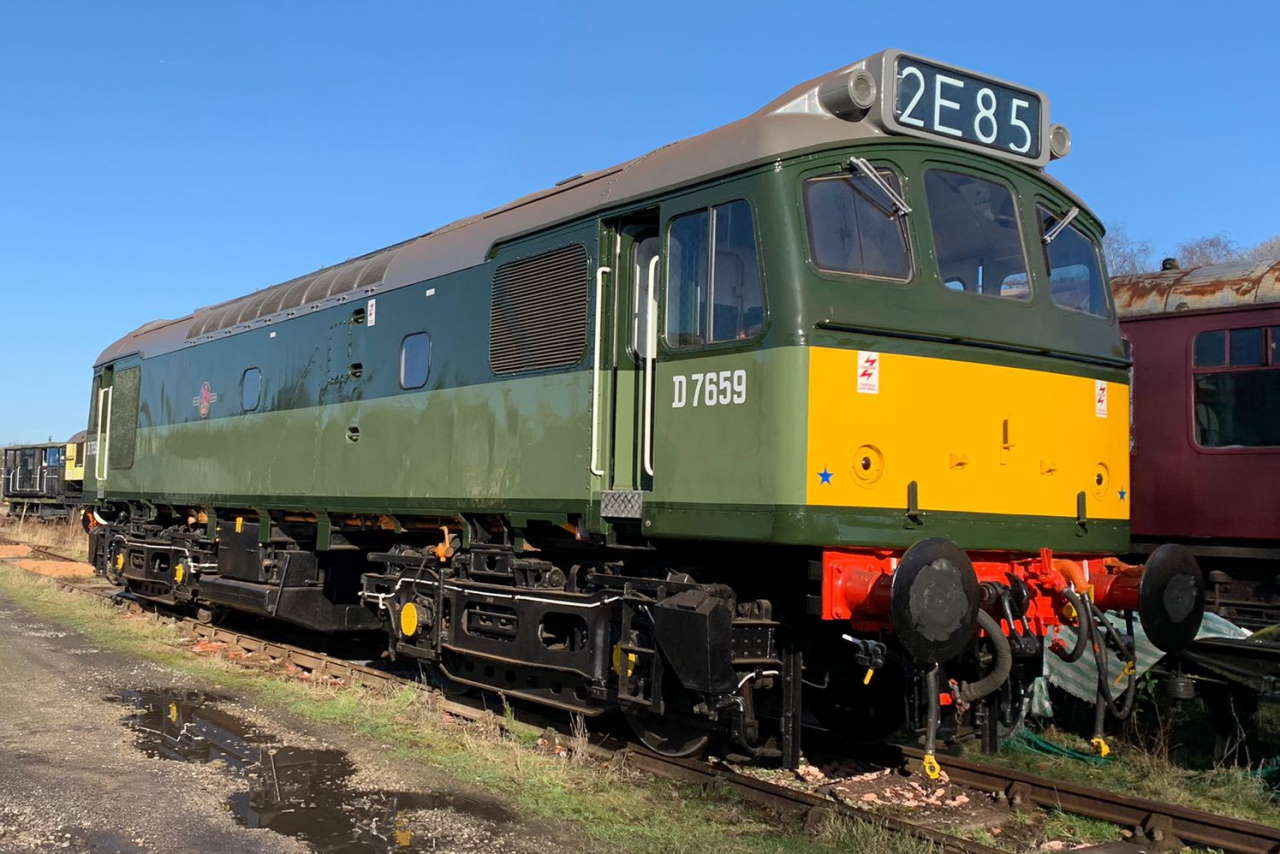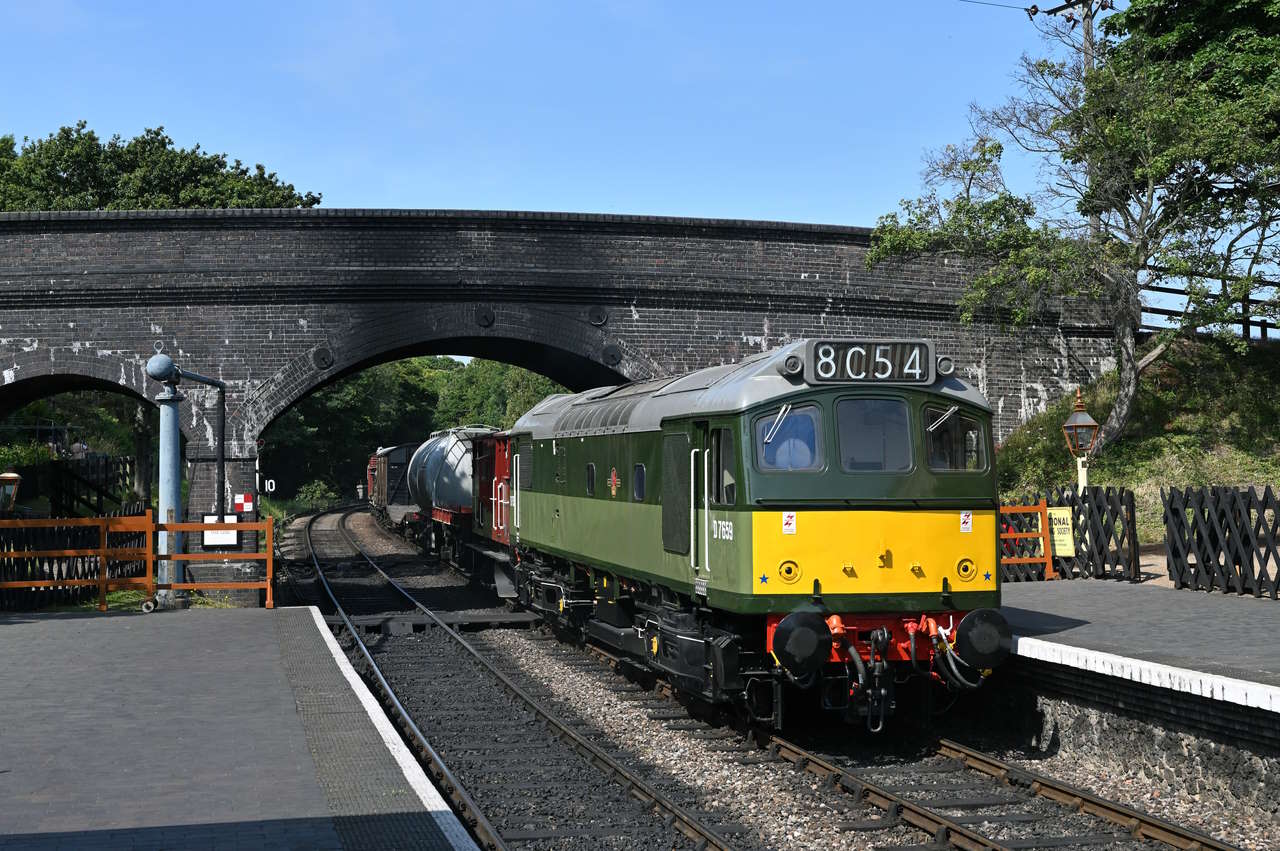A fifty-six-old British Rail Bo-Bo diesel locomotive is to join the roster for the Gloucestershire Warwickshire Railway’s annual Summer Heritage Diesel Gala in July.
The locomotive is recently-restored Sulzer Type 2 / British Rail Class 25 No. D7659 (7659/25309/25909), and is appearing courtesy of Peak Rail and the Waterman Railway Heritage Trust.
British Railways’ Crewe Works, Darlington Works, Derby Works, and by Beyer Peacock & co in Manchester built a total of 327 of these locomotives were built between 1961 and 1967. The Type 2s were numbered in two series between D5151–D5299 and D7500–D7677, and were fitted with 1,250 bhp Sulzer 6LDA28-B engines.
They mainly operated freight services, but also hauled passenger trains, with several of the class fitted with boilers to provide steam heating for such services. The Sulzer Type 2s had a route availability of 5 (RA5), so could be found all over the British Rail network, which led to them being dubbed ‘Rats’ by rail enthusiasts.
The locos were in regular service throughout the 1970s and the early 1980s, and also operated summer Saturday trains to Aberystwyth and workings between Crewe and Cardiff.
The were progressively withdrawn during the 1980s, and the last one was taken out of service in March 1987. The last loco was No. D7672/25322, which was then restored and continued to operate until 1991 working on railtours. Of the 327 locomotives built, twenty survived into preservation and are either in storage, operational or undergoing restoration.

Sulzer Type 2 D7659 was built by Beyer Peacock & Co. at its Gorton Works in Manchester (works No. 8069). It entered service on the London Midland Region (LMR), allocated to Line Power Controller, Derby (ML) on 21 July 1966 with a livery of BR two-tone green with small yellow warning panel livery (GSYP).
The loco was part of the final batch designated 25/3 and is particularly notable for being the last locomotive to be constructed by Beyer Peacock at Gorton before the works closed – further locomotives due to be built were transferred to BR Derby.
D7659’s British Rail career spanned just over twenty years, in a number of divisions and depots, spending time allocated to; London Division (D01), Nottingham Division (D16), Liverpool Division (D08), Manchester Division (D09), Birmingham Division (D02), Preston Division (D10), Springs Branch (Wigan) (SP), Longsight (LO), Willesden (WN), Cricklewood East (CW), Toton (TO), Kingmoor (KD) and Kingmoor (KM). The locomotive was renumbered into TOPS to 25309 in April 1974 and by April 1978, had been repainted into BR Blue with full yellow ends.
On 11 December 1985, 25309 was again renumbered, this time to 25909. It was intended to operate freight traffic for BR Railfreight’s Industrial Materials Division, but this traffic did not materialise and 25909 went into storage as unserviceable on the 11 August 1986. The following month, it was officially withdrawn, becoming the 284th member of the class to be retired from British Rail service.
The locomotive was then stored at Kingmoor for two years before being transferred to Vic Berry’s of Leicester via Crewe and Bescot during April 1988. It was saved for preservation by Pete Waterman and after asbestos had been removed, it left Vic Berry’s on 2 June 1988 for display at the Coalville Open Day on 4 June 1988. Following the event, it transferred to the East Lancashire Railway, arriving later that month.
The ’25’ operated for ten years in preservation and was last used on a passenger working in 1998, visiting the Gloucestershire Warwickshire Railway between 1996 and 1997. The locomotive moved to Peak Rail along with the rest of the Waterman Railway Heritage Trust’s collection in 2017.
D7659 returned to traffic in late part of 2021 following a full restoration, operating services for the first time in 23 years.
It will also be attending West Somerset Railway’s diesel festival in June and Epping Ongar Railway’s diesel gala in September.
Tickets for the summer diesel gala are available online from the GWSR website. The gala will feature up to eight diesel locomotives and a diesel multiple unit (DMU) running. The locomotive and carriage and wagon workshops will open their doors for rare behind-the-scenes visits and there will be plenty of other activity at the railway’s picturesque period stations.





Responses